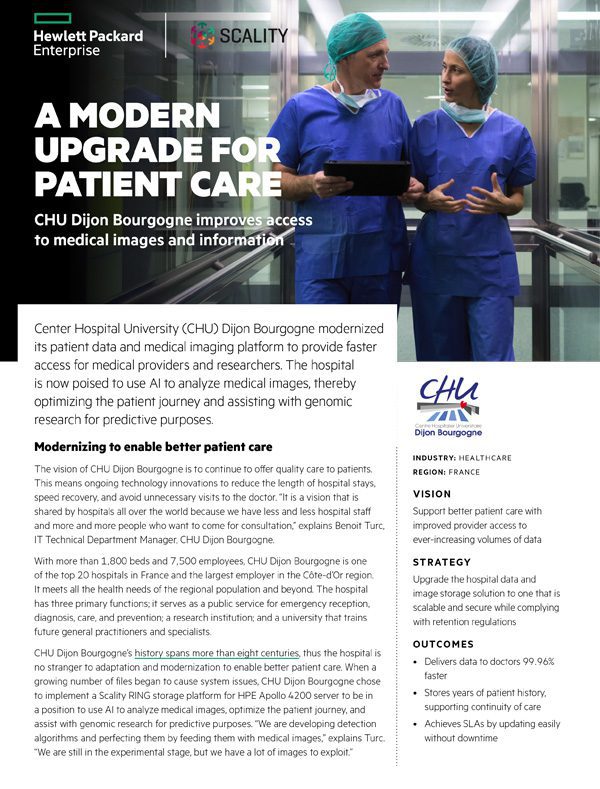
CHU Dijon Bourgogne
and massive scalability.
Download the Case Study

CHU Dijon Bourgogne
Modernizes medical imaging storage for 99.96% faster access and better care
By modernizing its medical imaging platform with Scality, the hospital will use AI to improve patient care and support genomic research.
Because its history spans more than eight centuries, Central Hospital University (CHU) Dijon Bourgogne is no stranger to adaptation and modernization.
Much has changed over the years, but one thing remains the same: the organization’s vision of offering quality care to patients. That means making fast and accurate diagnoses, reducing the length of hospital stays, speeding recovery, and avoiding unnecessary visits.
With more than 1,800 beds and 7,500 employees, Central Hospital University (CHU) Dijon Bourgogne is one of the top 20 hospitals in France — and lots of patients come through its doors. Lots of patients equate to massive and ever-increasing amounts of data that must be easily and immediately accessible by its network of health providers — and securely retained for long periods of time.
Medical images collected and stored
The sheer volume of medical images the hospital had to contend with had become problematic. The hospital’s existing storage solution had become unstable, didn’t maintain SLAs, and was difficult to update. It simply couldn’t keep up with the data storage requirements.
Data retention regulations require CHU Dijon Bourgogne’s medical imaging archive to be both highly scalable and secure. “The retention period for patient data is 20 years after the patient’s last visit to a doctor. If the patient comes every year, we must keep everything until 20 years after their death.” Turc continues, “Medical images are required to be kept even longer than the patient’s data, so we’re looking at centuries of medical images collected and stored.”
The hospital also needed a solution that could be extended without service interruption to users. “If the CHU Dijon Bourgogne IT department had not been able to meet the expectations of its users, I think researchers would have turned to shadow IT, and we would have lost data or even put some patients’ data at risk and ended up with a lack of control over costs,” Turc explains.
Moving to a modern storage platform brings immediate benefits
CHU Dijon Bourgogne opted for a Scality RING software‑defined object storage platform on HPE Apollo 4200 servers after Getronics, a trusted partner, introduced the solution to the hospital. Two of the deciding factors for choosing Scality were its reputation among hospitals and GE Healthcare’s endorsement of the solution as a good fit with the PACS.
The scalable solution, which has already been upgraded twice since implementation, was initially based on six HPE Apollo servers. Today, the hospital operates a Scality RING with approximately 1.2 PB and eight HPE Apollo servers with 2.5 PB inside. The new platform is spread over three data centers, which serves CHU Dijon Bourgogne’s security and service‑level goals.
The fact that the solution could work across multiple data centers with all the necessary security levels — and that the hospital could optimize disk usage — was an important motivation for CHU Dijon Bourgogne’s choice.
“We insisted that it be spread over the three data centers because we wanted to check that it was running correctly and, therefore, optimize the use of our disks and fill two‑thirds of the servers, with the others being used for redundancy and security purposes,” Turc says.
The net result is the data is well protected with replication and erasure coding, but the system places far less data on disks, so the hospital needs less capacity to store the same amount of data.

Vision

Strategy

Solution
The outcome
The combined Scality-HPE storage solution delivers the performance, reliability, and massive scalability that CHU Dijon Bourgogne needs.
Because providers don’t have to spend time looking for information, they can spend more time with patients. “Doctors are enjoying the first benefits of the new solution. Medical images and examination data from a patient’s file are available much more quickly than with our old system. The loading time is almost transparent for them,” Turc reports.
Medical specialists outside the hospital can access data and images through a portal with authentication mechanisms, which supports continuity of care. “Additionally, patients have access to their images and data, so they are using our Scality system without knowing it,” Turc says. In the future, the portal will also offer scheduling capabilities, further enabling patient self‑service.
The modern platform has put the hospital in a position to use AI to analyze medical images, optimize the patient journey, and assist with genomic research for predictive purposes. “We are developing detection algorithms and perfecting them by feeding them with medical images,” explains Turc. “We are still in the experimental stage, but we have a lot of images to exploit.”

Speed of Access

Scalability

Integrity

Data aggregation
Get inspired by our medical and healthcare portfolio
Trusted by the world’s most discerning and data-informed organizations




Explore our healthcare solutions
Healthcare
Content distribution with optimized workflows
Medical Imaging Archive
Faster data access
Weka and Scality
Performance of NVME storage
![]()
Find a reseller
See our channel partners by geolocation
![]()
Request a demo
Get a personalized presentation
![]()
Contact us
Reach out to our dedicated team

